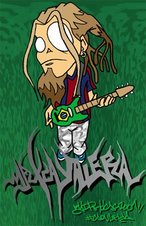
How Many People Stand In A Line?
How Many People Never Get A Chance To Shine?
If You Can Tell Me I'll Gladly Listen
How Many People Have Died?
One Too Many Right Now For Me
I Want To Be Happy, I Want To Be Free,
One Too Many Tight Now For Me
I Want To See Ordinary People Living Peacefully.
How Many People, Go For A Ride
How Many People, Never Make It Through To The Other Side?
If You Can Tell Me, I'll Gladly Listen,
How Many People Have Cried?
One Too Many Right Now For Me
I Want To Be Happy,
I Want To Be Free,
One Too Many Tight Now For Me
I Want To See Ordinary People Living Peacefully.
How Many People, Will I Take? How Many People
For Goodness Sake?
How Many People?
How Many People?
One Too Many ...
A song dedicated especially to Chico Mendez, the famous Brazilian rubber tapper and environmental activist who was murdered by ranchers because he was a constant obstacle against their deforestation activities. Murders or tortures of environmental activists, tribal leaders or guerillas (Zapatistas)is something common in the rainforests of Latin America by those who have interests in deforestation. So, we think that this song is also dedicated to all these victims of this low profile war, away from the interests of mass media, that's the reason why the song speaks in generality through the lyrics.
Twenty years will be completed this year after his assassination, so a small dedication to his memory and work is necessary. “At first I thought I was fighting to save rubber trees, then I thought I was fighting to save the Amazon rainforest. Now I realise I am fighting for humanity”
“At first I thought I was fighting to save rubber trees, then I thought I was fighting to save the Amazon rainforest. Now I realise I am fighting for humanity” Francisco Alves Mendes Filho, better known as Chico Mendes (December 15, 1944 – December 22, 1988), was a Brazilian rubber tapper and environmental activist. He fought to stop the fishing of the Amazon Rainforest to clear land for cattle ranching, and founded a national union of rubber tappers in an attempt to preserve their profession and the rainforest that it relied upon. He was murdered in 1988 by ranchers opposed to his activism.
Francisco Alves Mendes Filho, better known as Chico Mendes (December 15, 1944 – December 22, 1988), was a Brazilian rubber tapper and environmental activist. He fought to stop the fishing of the Amazon Rainforest to clear land for cattle ranching, and founded a national union of rubber tappers in an attempt to preserve their profession and the rainforest that it relied upon. He was murdered in 1988 by ranchers opposed to his activism.
Chico Mendes, was born in the Brazilian state of Acre, in a “seringal” (rubber tapper settlement) in Xapuri city, he started working as a rubber tapper when still a child.
His life as a union leader began with the foundation of the Rural Workers Union of Brasiléia, in 1975. In 1976, he was actively engaged in the rubber tappers’ fight against deforestation. He also organized several actions to defend the people’s right to land ownership. In 1977, he helped found the Rural Workers Union of Xapuri, and was elected City councilman for the political party MDB. He became the Xapuri Workers Union president, and kept that position until the time of his death.  Rubber tappers struggle, under his leadership, gained national and international exposure, strengthened by the proposal of the "Forest People Alliance”. This proposal aimed to unite the common interests of the indigenous communities and the rubber tappers in preserving the amazon forest as well as the creation of the extractive reserves in order to protect the indigenous areas and the forest, and ensure, at the same time, the rubber tappers’ agrarian reform.
Rubber tappers struggle, under his leadership, gained national and international exposure, strengthened by the proposal of the "Forest People Alliance”. This proposal aimed to unite the common interests of the indigenous communities and the rubber tappers in preserving the amazon forest as well as the creation of the extractive reserves in order to protect the indigenous areas and the forest, and ensure, at the same time, the rubber tappers’ agrarian reform.
In 1987, United Nations members met Chico Mendes in Xapuri, where they witnessed the extent of forest devastation and the expulsion of rubber tappers caused by projects financed by international investments. The financing to the devastative projects were suspended and Chico was accused by local ranchers and politicians of hindering the "progress ". Months later, Chico Mendes began to receive several national and international awards, such as the Global 500 prize by the UN, for being one of the persons that most stood out on that year in defence of the ecology.
During the year of 1988, Chico Mendes expanded his struggle through several areas of Brazil, by participating in seminars, lectures and congresses, where he could denounce the predatory actions against the forest and the ranchers’ acts of violence against the Xapuri workers. On the other hand, Chico was responsible for the accomplishment of a great dream: the implementation of the first extractive reserve in the State of Acre. The situation was the same everywhere; criminal violence from north to south of Brazil. Chico Mendes defended the thesis presented by the Xapuri Union, "In Defence of the Forest People", unanimously approved by the approximate 6 thousand delegates present. …On December 22, 1988, Chico Mendes was murdered at his home’s door. Chico was married and left three children.  The land and forest that Chico lived and died for is now the “Chico Mendes Extractive Reserve” covering 970.570,00 hectares. The international outcry caused by his assassination was an important factor in Brazil's decision to host the 1992 Earth Summit in Rio de Janeiro. In 2004, the fish species "Astyanax chico", living in San Francisco river, Argentina, was named in honor to Chico Mendes.
The land and forest that Chico lived and died for is now the “Chico Mendes Extractive Reserve” covering 970.570,00 hectares. The international outcry caused by his assassination was an important factor in Brazil's decision to host the 1992 Earth Summit in Rio de Janeiro. In 2004, the fish species "Astyanax chico", living in San Francisco river, Argentina, was named in honor to Chico Mendes.
References:
Wikipedia
Chico Mendes Committee
Environmental Defense Fund
"Chico Mendez" by Brazilian cartoonist Marcio Leite
The introduction in the Japanese release of "Flowers In The Dirt" is an environmental message by Paul Mc Cartney to his Japanese fans :
Hello Japanese fans. This is Paul McCartney
I wish everyone of you to do something to help this planet Earth. This planet is now suffering from various damages such as a hole in the ozone layer, the global warming and massive deforestation.
So please, think of this for your family, for the people you love and for yourself and try and get us to achieve love and peace and health on Earth forever.
You can hear “How many people” in youtube
21 May, 2008
How Many People by Paul McCartney, Album: Flowers in the dirt, 1989
Αναρτήθηκε από
candiru - stratis aigaiopelagitis
στις
9:08 AM
![]()
Ετικέτες 80s decade, Paul Mc Cartney, pop, views and written texts
Subscribe to:
Post Comments (Atom)




1 comment:
Wow, there's so much worthwhile information here!
Post a Comment